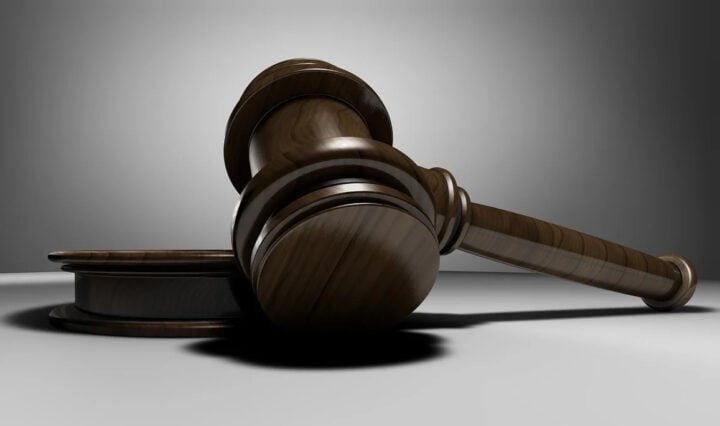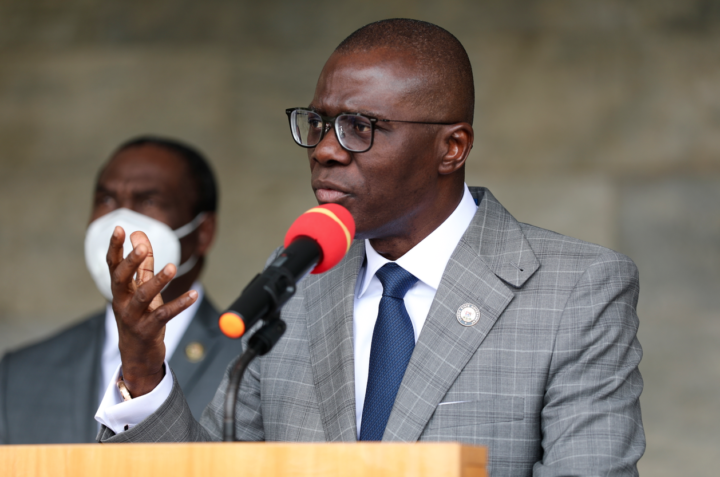On September 3, 2021, Samuel Ortom, Benue state governor, instituted a N60 billion suit against George Akume, minister of special duties and intergovernmental affairs.
In the suit marked MHC/268/2021 filed before a high court in Makurdi by Okon N. Efut, a senior advocate of Nigeria (SAN), Ortom is seeking N50 billion as general damages for libel, and N10 billion as exemplary and aggravated damages.
In the statement of claim, the governor is seeking a declaration that the text of Akume’s press conference, held on August 30, 2021, in Abuja, and the reports in various national dailies is “scandalous, malicious and injurious” to his person.
Ortom alleged that the press conference was intended to lower his reputation before right-thinking members of the society and to expose him to “hatred, contempt and ridicule”.
Advertisement
CAN A GOVERNOR SUE FOR LIBEL?
Political office holders in executive positions such as the president, vice-president, governors, are usually subjects of criticism, and in some cases, unverifiable damaging information about them is disseminated.
Section 308 of the 1999 Constitution provides context for court cases involving such political office holders.
Advertisement
Sec 308: (1) Notwithstanding anything to the contrary in this Constitution, but subject to subsection (2) of this section:
(a) no civil or criminal proceedings shall be instituted or continued against a person to whom this section applies during his period of office;
(b) a person to whom this section applies shall not be arrested or imprisoned during that period either in pursuance of the process of any court or otherwise; and
(c) no process of any court requiring or compelling the appearance of a person to whom this section applies, shall be applied for or issued;
Advertisement
Provided that in ascertaining whether any period of limitation has expired for the purpose of any proceedings against a person to whom this section applies, no account shall be taken of his period of office.
(2) The provisions of subsection (1) of this section shall not apply to civil proceedings against a person to whom this section applies in his official capacity or to civil or criminal proceedings in which such a person is only a nominal party.
(3) This section applies to a person holding the office of President or Vice-President, Governor or Deputy Governor; and the reference in this section to ‘period of office’ is a reference to the period during which the person holding such office is required to perform the functions of the office.
However, prior to Ortom’s suit against Akume, there have been instances in which governors instituted court cases over libel or defamation.
Advertisement
On July 23, 2004, Donald Duke, while he was governor of Cross River state, instituted an action against Global Excellence Communications Ltd and three others at the high court of Cross River in suit No. HC/261/2004.
The governor had prayed the court for the sum of N5 billion as damages for libel allegedly published against him by the defendants in “the ‘Global Excellence’ Magazine of Tuesday May 11 – May 17, 2004 and Tuesday May 25 -May 30, 2004″.
Advertisement
He had also asked for exemplary or punitive damages in the sum of N10 billion.
But the defendants had raised a preliminary objection that “the plaintiff cannot, by virtue of the provisions of section 308 of the Constitution of the federal republic of Nigeria, 1999, institute, maintain, or continue with any proceedings, including the present suit, in any court of law, nor can any proceedings be instituted, maintained or continued against him in his personal capacity”.
Advertisement
Upon the conclusion of arguments on the preliminary objection, the trial judge held, among others, that “a serving governor cannot sue or be sued in his personal capacity while still in that office”.
Not satisfied with the ruling, Duke went to the court of appeal and by a majority decision, the appeal was allowed on May 2, 2006. But Global Excellence Communications Ltd appealed the decision of the court.
Advertisement
Delivering judgment in the appeal marked S.C. 313/2006, on July 13, 2007, Walter Onnoghen, justice of the apex court, held that “from the words used by the framers of section 308 of the 1999 Constitution, it is clear that their intention is explicitly to confer absolute immunity on the respondent and the others therein mentioned without a corresponding disability on them to the exercise of their rights to institute actions in their personal capacities in any relevant court of law for redress during their tenure of office, as in the instant case”.
Niki Tobi, another justice of the apex court, in his judgment, held that “Section 308 only bars or prohibits a person from instituting civil or criminal proceedings against the respondent. The section does not say that the respondent, who comes under subsection (3), cannot sue for any wrong done him.”
“In other words, while the section bars any person to sue the respondent, it is silent in respect of the right of the respondent to sue for a wrong done him. It will be wrong to say that the silence of the section anticipates that the respondent cannot sue,” the judge held.
“In my view, if the constitution does not specifically provide for a situation or silent on a situation, it will not be right for the courts to read into the constitution a particular meaning, as submitted by counsel for the appellants, barring the respondent from suing.
“Access to court is a constitutional right which can only be taken away by a clear provision in the constitution. It cannot be taken away by implication or speculation by the courts.”
In the case of Onabanjo v. Concord Press of Nigeria Ltd. (1981) 2 NCLR 399, Olabisi Onabanjo, while he was governor of Ogun state, in his personal capacity, sued the publisher of Concord Newspapers for alleged libel, claiming N500,000 as damages.
The defendant, however, relying on section 267 of the 1979 Constitution of Nigeria, raised a constitutional objection to the jurisdiction of the court, saying since the governor cannot be sued in his private capacity while in office, it is inequitable and unconstitutional for the governor to sue in his personal capacity.
But J. Kolawole, judge of Ogun state high court at the time, held that since the governor was not expressly incapacitated by any provision of the constitution, he could sue in his personal capacity.
Another question that also arises is that in the event of a suit instituted prior to assumption of office, can a person can pursue an appeal against such political office holders while they’re still in office?
In the case of Bola Tinubu v. I.M.B. Securities PLC, the former Lagos governor had appealed the decision of a Lagos high court in a suit instituted against him in 1992.
Tinubu had lodged an appeal at the court of appeal, Lagos division, on June 12, 1995. While the appeal was pending and the parties had duly filed and exchanged their respective briefs of argument in respect thereof, he was elected as governor of Lagos.
Consequently, the respondents applied to the appellate court seeking an indefinite adjournment of the appeal pending when the appellant’s tenure is over.
The respondents asked the court to resolve “whether or not the appellant (Tinubu) can continue the appeal in the light of Section 308(1) of the 1999 Constitution”.
The court of appeal, in its ruling, adjourned the matter sine die (indefinitely).
Dissatisfied, Tinubu went to the supreme court. Delivering the lead judgment on October 5, 2001, Anthony Iguh, supreme court justice, held that “to allow the appellant, who is now the executive governor of Lagos state, to further press on with his appeal is another way of continuing the suit before the lower court”.
“It seems to me that while I recognise that a governor may sue for redress of personal wrongs to him, the right to sue for personal wrongs cannot be equated with a right to appeal in the course of a suit which being contrary to Section 308(1) (a) of the 1999 Constitution cannot be continued,” he said
In other words, the appeal was disallowed because it was brought under a civil case instituted by another party against Tinubu, and the suit could not be sustained as long as he was governor.
CONCLUSION
“Expressio unius exclusio alterius” is a Latin term which means ‘the express mention of a thing excludes others’.
Section 308 of the 1999 Constitution does not expressly state that a president, vice-president, governor or deputy governor cannot sue in their personal capacities. And where this is not mentioned, it is safe to say that they can institute legal actions in their personal capacities to seek redress.
The philosophy guiding section 308 is essentially to ensure that occupiers of such political positions are not distracted from discharging their official duties.
However, it should be noted that while they cannot be sued in their personal capacities, their offices can be sued.
CAUTION
An executive office holder who sues for libel runs the risk of exposing himself or herself to damaging evidential materials if he/she fails to double-check on the content of such third party publications.
If they are found to be true, under the doctrine of justification, which is an absolute defence for libel, such a person may discredit the government he or she represents.
As the saying goes, “those who live in glass houses should not throw stones.”
Add a comment






